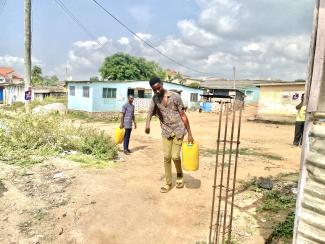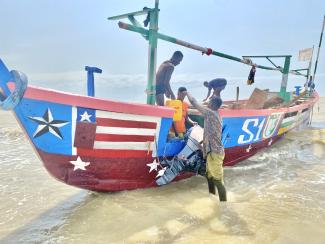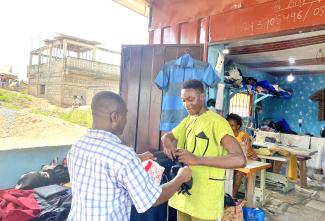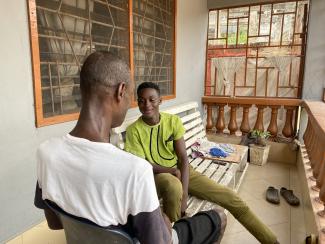Overcoming Adversity: Hackman’s Journey to a Fresh Start
Craftsmanship and determination wins over stigma.
In Shama, a bustling fishing community in Ghana’s Western Region, 22-year-old Hackman Bossman has defied the odds to carve out a path to success.
Hackman was born with limited use of his right hand due to a birth injury and faced many challenges growing up: “I was excluded from some school activities because people assumed I was unfit. This caused me to become reserved and negatively impacted my self-esteem” he recounts.
After his mother passed away, Hackman was raised by his father, a secretary to a fishing canoe owner. When his father fell ill and relocated to Shama, Hackman dropped out of school to support them. “I have been ill for more than 10 years and haven’t been able to work or provide for my son” says Hackman's father.

Yaw Doe, Communications Officer, Hen Mpoano
Every day, Hackman would fetch gallons of water from nearby commercial taps and deliver them to fishing canoes embarking on exhibitions. In return, he would receive fish that he then sold to make ends meet. It was a physically demanding task, and despite his efforts, the declining fish stock made it hard to sustain his water supply business.
“I used to make between 15 to 20 Ghana Cedis (approximately 1.12 to 1.49 U.S. Dollars) a day. Sometimes, I would get nothing if there was no fish,” Hackman says.
One day, during one of his trips to the commercial tap to fetch water for supply, Hackman heard a broadcast from the community information center advertising a USAID supplementary livelihoods program for youth in fishing communities.
Seizing the opportunity, he decided to pursue tailoring. For 10 months, he trained in fashion, fabric cutting, and sewing.
Despite his disability, Hackman persevered with encouragement from his mentor and teacher, Eric, who empathized with his struggles and was determined to see him succeed. “I faced a lot of challenges growing up myself,” admits Eric, “so I have a lot of empathy towards Hackman. I was determined to see him through his training.”
Hackman graduated from the program in 2023. “I am glad I did not give up. I want my story to be a testament that one’s disability shouldn’t limit them,” Hackman says.

Yaw Doe Bonah-Mensah, Hen Mpoano
Today, he works in Eric’s tailoring shop, making an average of 100 to 200 Ghana Cedis (approximately 7.45 to 14.91 U.S. Dollars) daily, and can support himself and his father.
“The livelihood training did not only equip us with a skill, but also in financial literacy and entrepreneurship. We also were supported with startup kits like sewing machines and other tailoring accessories to help us start our own businesses.”
Hackman’s craftsmanship and determination have won over many clients; as his customer base grows and orders increase, Hackman hopes to start his own business in the near future.

Yaw Doe Bonah-Mensah, Hen Mpoano

Yaw Doe Bonah-Mensah, Hen Mpoano.

Yaw Doe Bonah-Mensah, Hen Mpoano.
About this Story
- Ghana’s fish stocks have been in a sharp decline since 1999 (FAO, 2016). This development is affecting the sustenance of people in coastal fishing communities, leading to increased unemployment, poverty, and food insecurity.
- Ghana’s marine fishery stocks—mainly the sardinella, anchovy, and mackerel stocks—are under sharp decline and facing a total collapse. The resource directly and indirectly provides employment to about 10 percent of the country's population.
- USAID is providing alternative opportunities for youth in fishing communities through its supplemental livelihood program by enrolling them in skills training programs for various financially and socially viable trades.
- The training and business startup support will help shift youth dependence on fishing activities as the main or only source of livelihood to other trades.
- The Feed The Future Ghana Fisheries Recovery Activity (GFRA) will train 8,000 youth from fishing communities on garment making, electrical engineering, carpentry, baking, and more between 2022 and 2026.
Story by Perfectual Labik, GFRA Communications, and Social and Behavior Change Specialist, with support from Atiewin Mbillah-Lawson, USAID/Ghana.

